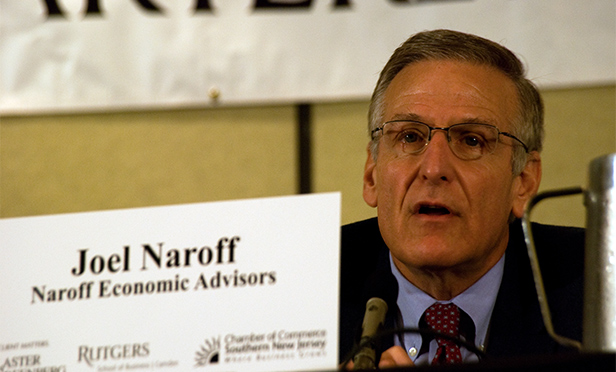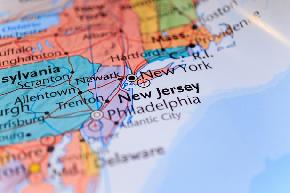 Joel Naroff, president, Naroff Economic Advisors (Steve Lubetkin Photo/StateBroadcastNews.com)
Joel Naroff, president, Naroff Economic Advisors (Steve Lubetkin Photo/StateBroadcastNews.com)
TRENTON, NJ—The impasse between the state’s legislature and governor over implementation of a higher gas tax to fund the state’s insolvent Transportation Trust Fund will have serious implications for business development and economic growth in the Garden State if it is not resolved quickly, according to several business leaders and economists who spoke exclusively with GlobeSt.com.
 Michael McGuinness, Executive Director, NJ NAIOP
Michael McGuinness, Executive Director, NJ NAIOP
“It’s just very frustrating at this eleventh hour that we’re having these poorly thought-out, not well-articulated proposals being shared,” says Michael McGuinness, executive director of the New Jersey Chapter of NAIOP. “I just think that whole system is not very effective for producing sound public policy, especially as it relates to something as near and dear to our economy as a stable, healthy transportation system.”
The delay in implementation is “a double-edged sword,” says Thomas Bracken, president of the New Jersey State Chamber of Commerce. “The inaction in implementing it right now is not good,” he says. “It’s such a crucial issue for the state, to be deadlocked and not find a compromise solution to get this done, doesn’t look good for the state’s ability to address their major problems.”
You can hear an extended version of GlobeSt.com’s conversations with the business leaders in the audio player below.
 Thomas Bracken, president, New Jersey State Chamber of Commerce
Thomas Bracken, president, New Jersey State Chamber of Commerce
Perception of state paralysis can negatively affect the decision-making of companies thinking about relocating to New Jersey, Bracken says. And despite billions spent to retrofit the ports of New York and New Jersey to accommodate the “neo-Panamax” vessels able to traverse the new, wider Panama Canal, he says shippers concerned about highway infrastructure issues in New Jersey may well seek other ports instead of investing in New Jersey.
“They’re going to start to opt for other ports,” he says noting that much-needed highway and bridge clearance and maintenance projects are languishing. “The longer we wait, the longer it’s going to take to start those projects. That’s just going to put off the desire for those shippers to come here. And if they start using other ports and find them acceptable, it’s going to be tough to lure them back here. Time is not our ally here, time is our enemy.”
“It would make it easier for our competitors in the Lehigh Valley, in lower New York State, in Baltimore and beyond, to be able to attract a lot of these companies,” says McGuinness. Noting the large consumer market New Jersey and New York inhabit, he adds, “Without adequate funding, without sending a message to companies that are thinking of investing in this market, we’re going to lose those jobs, we’re going to lose those investment dollars to other markets outside our borders.”
Infrastructure is the one investment that government cannot afford to ignore, says Joel Naroff, president of Naroff Economic Advisors, a strategic economic consulting firm in Holland, PA.
“New Jersey has essentially allowed it to deteriorate, and it goes back 20 years,” he says. “Most of the trust funds were being raided to balance budgets in the state, and the fiscal irresponsibility that’s been around for decades – and it’s bipartisan, they’re both equally to blame for destroying the fiscal responsibility of the state – the state is extraordinarily well-positioned for future growth. The world economy is not going away, and globalization and interrelationships will only expand. New Jersey is in that position with its ports, its airports. We need the roadways. People think of trade and forget there’s a distribution element to it.”
 James Hughes, dean of the Edward J. Bloustein School of Planning and Public Policy, Rutgers University
James Hughes, dean of the Edward J. Bloustein School of Planning and Public Policy, Rutgers University
Every period of significant economic advance in New Jersey has been preceded by significant investments in transportation capacity, says James Hughes, dean of the Edward Bloustein School of Planning and Public Policy at Rutgers University.
New Jersey had the first state highway department as early as 1916, he says. Construction of the New Jersey Turnpike and Garden State Parkway after World War II “really bolstered the prosperity of the 1960s and 1970s,” he says, adding that investments in public transit led to economic growth in the 1980s and 1990s. “Clearly, historically economic growth really depended upon significant increases in transportation capacity.”
The recently completed widening of the New Jersey Turnpike from Exit 8A to Exit 6 made industrial development possible in areas like Robbinsville, near Trenton, and further south along the toll road, Hughes says. “Had the Turnpike not been expanded, those sites would have been much less viable,” he says. “You can’t have a world-class economy without a world-class transportation system.”
Decisions on locating businesses will be based on the state’s capacity to deal with its problems, Hughes says. “Firms like certainty, they want to see progress,” he says. “They’re not going to make an investment decision in New Jersey until these problems are resolved. Several years down the road, we’re going to be paying the price if we don’t get this resolved.”
Naroff is pessimistic that a legislative solution is near. “They don’t blame themselves for the fact that they’re unwilling to raise taxes to provide the necessary funds for the maintenance and expansion of the infrastructure,” he says. “All I know is that infrastructure spending is critical for future growth of the state. If you don’t have the money, you don’t grow. The rest is politics. Are you willing to make the commitment or not?”
“People are alarmed at how this whole thing transpired, and are really disappointed that the leaders of our state can’t come up with a compromise on something that’s so vitally important,” says Bracken.

















 Copyright © 2024 ALM Global, LLC. All Rights Reserved.
Copyright © 2024 ALM Global, LLC. All Rights Reserved.